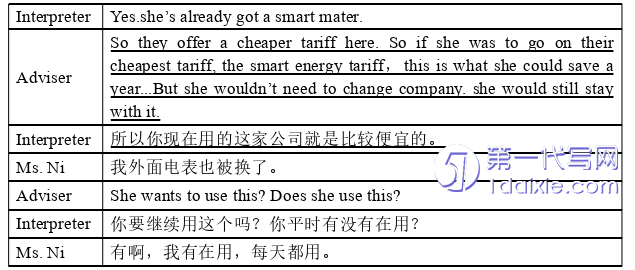本文是一篇英语毕业论文,笔者通过对具体案例的研究,发现在语言层面可采取增译,省译,信息重组等方法技巧,非语言层面采取注意力引导、语言引导、协助性具体行为来帮助解决问题,促进口译任务顺利进行。通过该报告,译员可更好地了解自身优势和不足,为以后的翻译实践提供经验和指导,同时可为同行译员提供借鉴材料。
Chapter One Introduction
1.1 Brief Introduction of the Task
In recent years,with series of political and natural factors,such as supply disruptions,geopolitical tensions affecting energy markets,public emergency impacting infrastructure,andthe ongoing transition to renewable energy sources,the United Kingdom has been facing anenergy crisis.Electricity and gas prices have experienced a significant surge,with rates rising byapproximately 300%during this period.
Consequently,a majority of households in the UK have faced substantial economic pressuredue to the rising electricity and gas costs.Among them is Ms.Ni,who found herself burdened byescalating utility bills.Frustrated by the sudden increase,she sought assistance from a charitableorganization.The charity connected her with Edinburgh Citizen Advice,which specialized inaddressing energy-related concerns.Here,energy Adviser Karen Airlie conducted a home visit toMs.Ni’s residence,offering clarifications on her queries and providing valuable advice onenergy-saving practices.
In response to the charity’s invitation,the author acted the interpreter and coordinator forthis home visit involving Karen and Ms.Ni.The interpreter entails facilitating effectivecommunication between the parties involved,ensuring a smooth exchange of information,andcontributing to the overall success of the energy consultation.
1.2 Organization of the Report
This report consists of five chapters.The first chapter provides an initial overview of thereport.It commences with a concise introduction to the task,laying the foundation for thesubsequent discussions.Following this,the chapter one outlines the overall structure andarrangement of the report’s content.The second chapter begins by contextualizing the taskthrough an exploration of its background,and delves into the distinctive features and challengesduring this interpreting task.The third chapter focuses on pre-interpreting preparation involvingbasic information and theoretical support.In terms of basic information,the author researchedbackground information,clients’expectations,and glossary.Additionally,this chapter clarifiesInterpreter’s Subjectivity and different roles played by interpreters during interpreting.The mainbody chapter four analyses the problems in the interpreting task and tactics the interpreteradopted for tacking these problems.To be specific,this chapter proceeds to address challengesarising from the absence of subjectivity consciousness,including the failure to function as agatekeeper,co-interlocutor,and coordinator.In response to these challenges,correspondingtactics such as addition,omission,reconstruction,attention redirecting,and practical assistanceare put forward.The last chapter summaries the key findings derived from the study.It alsohighlights any limitations encountered and prospects for future endeavors related to the task andits interpretation.

Chapter Two Task Description
2.1 Participants of the Task
The task involves the collaboration between an energy adviser Karen Airlie,and localcitizen Ms.Ni,who was grappling with the significant surge in electricity costs within the UKover the past few years.In response to the financial strain and uncertainties surrounding herelectricity bills,Ms.Ni expressed her concerns and needs to ELREC,an organization dedicatedto addressing such energy-related issues.In order to bridge the communication gap and facilitatea meaningful exchange,the interpreter was entrusted with the task of mediating the dialoguebetween Ms.Airlie and Ms.Ni.
Throughout the interpretation process,the interpreter gives play to interpreter’s subjectivity,strategically employing a range of techniques and skills to optimize communication between theparties involved.Drawing upon their linguistic proficiency and cultural awareness,theinterpreter managed to convey complex energy-related concepts in a manner that resonated withMs.Ni,making the information more accessible and comprehensible.However,as the thesiscritically examines,there were instances where the interpreter's subjectivity could have beenfurther pronounced.It highlights areas where the interpreter might have better adapted theirapproach to align with the specific communication dynamics of Ms.Airlie and Ms.Ni.
2.2 Features and Difficulties
Liaison interpreting is a communicative activity and it is different from other forms ofinterpreting because it is closely related to daily life experiences(Li,2015).Pöchhacker(2001)pointed out that“interpreting is not simply a text processing task but a process of facilitatingsuccessful communication”.Thus,interpreters are required to be equipped with goodintercultural communication competence to coordinate and facilitate conversations.Ren Wen(2010)defined liaison interpreting as a special discourse process that involved three parties:twocommunication participants and the interpreter.In such process which is full of interaction,controversy and coordination,the liaison interpreter is a powerful person who could influenceboth process and result of the communicative activity.Apart from the characteristics mentionedby scholars home and abroad,this interpreting task has its own features and difficulties,whichrequires the interpreter's well preparation for specific challenges.
2.2.1 Features of Task
The home visit for energy consulting encapsulates several distinctive features that revolvearound its strong professionalism,real-time nature,unpredictability,and problem-solvingorientation.These facets collectively contribute to an effective communication exchangebetween energy Adviser Karen,homeowner Ms.Ni,and interpreter.
Chapter Three Pre-Interpreting Preparation and Theoretical Support ........ 7
3.1 Pre-interpreting Preparation ............................ 7
3.1.1 Background Information ............................. 7
3.1.2 Clients’ Expectations ........................... 8
Chapter Four Case Analysis: Problems and Coping Tactics .................... 15
4.1 Failure to be Gate-keeper .............................. 15
4.1.1 Problems ..................................... 15
4.1.2 Coping Tactics ......................... 17
Chapter Five Conclusion ........................... 29
5.1 Findings ......................................... 29
5.2 Limitations ........................... 29
Chapter Four Case Analysis:Problems and Coping Tactics
4.1 Failure to be Gate-keeper
Gate-keeper is one of the roles in interpreting task who should ensure that information isaccurately conveyed during the interpreting process(Ren,2010).However,during this liaisoninterpreting,some problems such as loss of information and redundancy of information arecaused by failure to display interpreter’s subjectivity.As to these specific problems,addition andomission can be adopted to tackle them.
4.1.1 Problem
During this interpreting task,problems caused by failure to be Gate-keeper mainly involveloss of information and redundancy of information.
The loss of information in interpreting usually occur when the interpreter fails to captureevery detail,nuance,or element of the original message.Wang Ying(2011)believes loss ofinformation can be caused by various factors such as time constraints,memory limitations,differences in language structures,and the interpreter’s subjective choices.As a result,certainaspects of the source text may be omitted,condensed,or paraphrased in the target language,potentially leading to misunderstandings or incomplete communication.To mitigate this,skilledinterpreters often strive to balance accuracy and efficiency,making conscious decisions aboutwhat to include,omit,or emphasize while ensuring the overall essence of the message isconveyed(Wei Jiahai,2007).Loss of information caused by interpreter’s improperly subjectivechoice are discussed in the following example.

Chapter Five Conclusion
5.1 Findings
Based on the theoretical support of Interpreter’s Subjectivity,this interpreting practicereport outlines the challenges faced and coping tactics adopted by the interpreter duringinterpreting task.Through analyzing to specific examples from the liaison interpreting task,thereare three major findings as follows:
On one hand,during the interpreting task,the interpreter failed to display her subjectivity inplaying the roles of gate-keeper,co-interlocutor,and coordinator to facilitate the communication.First,as to failure to be gate-keeper,the problems of loss of information and redundancy ofinformation can be observed.For failure to be co-interlocutor,there are some problems aboutscattered information and conservation interruption.As to failure to be coordinator,theinterpreter didn’t mediate all participants in the conservation all time,and sometimes she was notskillful for energy devices.
On the other hand,the author finds some effective coping tactics to improve interpretingquality.Firstly,For solving the problems caused by failure to be gate-keeper,several interpretingtechniques such as addition,omission are put forward to ensure the accuracy and clarify ofinformation.Secondly,for better playing the role of co-interlocutor,information reconstructionand attention redirecting can be adopted to enhance a smooth communication.Thirdly,As acoordinator,range of supportive actions including language guidance and practical assistancewere embraced to tackle problems and facilitate the advancement of the interpretation task.
reference(omitted)
